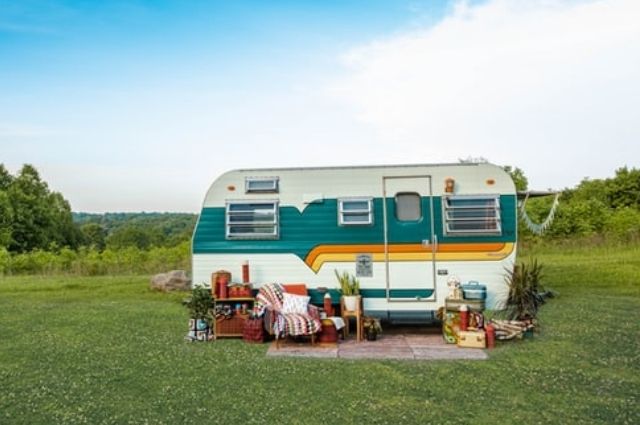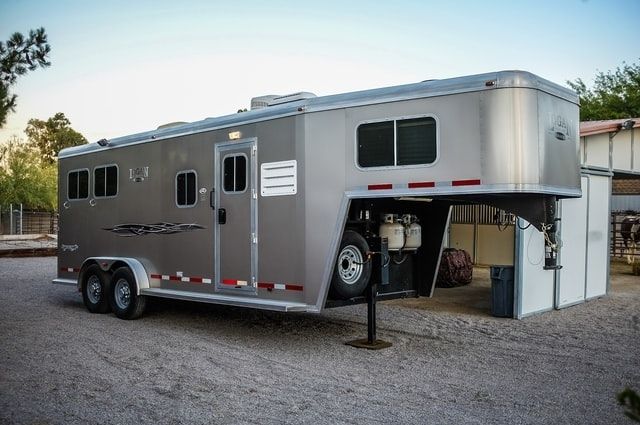Traveling in an RV is a fun and exciting way to explore the great outdoors, visit new places, and create lasting memories with friends and family. One of the key aspects of an enjoyable RV experience is maintaining a comfortable environment inside your home on wheels.
A significant part of this comfort comes from having a well-functioning air conditioning system, especially during those hot summer days. However, to power your RV’s air conditioner, you need an appropriate generator.
In this comprehensive guide, we will help you understand the factors to consider when choosing the right size generator for your RV air conditioner.
Can You Run RV AC on the Generator?
Yes, you can run your RV air conditioner with a portable generator. You just need to select an RV-ready portable generator. Then plug in the AC line in the generator. You are good to go.
You should be careful while selecting the generator for the RV air conditioner. You could select an Inverter generator if you have the budget. They are economical and produce less noise. If you are on a tight budget, you could go for an open-frame generator. They are also worthy of money.
Understanding RV Air Conditioner Specifications
Types of RV air Conditioners
- Rooftop air conditioners: These are the most common type of air conditioner found in RVs. They are mounted on the roof and provide effective cooling throughout the interior space.
- Portable air conditioners: These are standalone units that can be moved around inside the RV. They are a flexible option for those who want to cool specific areas but may not be as powerful as rooftop air conditioners.
Power requirements (wattage and amperage)
- Starting watts: The initial surge of power required to start the air conditioner’s compressor. This value is typically higher than the running watts.
- Running watts: The power required to keep the air conditioner running continuously once it’s started.
British Thermal Units (BTUs)
BTUs indicate the cooling capacity of an air conditioner. A higher BTU rating means the unit can cool a larger area more effectively. It’s essential to choose an air conditioner with an appropriate BTU rating for your RV’s size.
Generator Types and Features
Conventional generators: These are the traditional type of generator that uses a motor to produce electricity. They are usually more affordable but can be noisy and less fuel-efficient.
Inverter generators: These generators use advanced technology to produce clean and stable electricity, which is ideal for sensitive electronics. They are quieter and more fuel-efficient but may come at a higher price.
Fuel types
- Gasoline: Widely available and easy to use, but may have a shorter shelf life and produce more emissions.
- Diesel: More fuel-efficient and offers longer run times, but may be more expensive and harder to find in some areas.
- Propane: Burns cleaner and has a longer shelf life, but may be less efficient and have lower power output compared to gasoline or diesel generators.
Noise level considerations
Generators can be noisy, so it’s essential to consider the noise level when choosing a generator for your RV. Inverter generators tend to be quieter than conventional generators.
Parallel capability
Some generators have the option to connect two or more units in parallel, increasing their combined power output. This can be a helpful feature for those who may need additional power for their RV.
How to Calculate the Required Generator Size?
- Identifying your RV air conditioner’s power needs: Check the manufacturer’s specifications to find the starting and running watts required for your air conditioner.
- Factoring in additional power needs (appliances, devices, etc.): Make a list of all the other electrical devices and appliances you’ll use in your RV and their wattage requirements. This will help you determine the total power needed for your RV.
- Safety margin and future expansion: Add a 20-25% safety margin to the calculated wattage to account for power fluctuations and potential future needs.
- Choosing the right generator size: Based on the calculated wattage, including the safety margin, select a generator with the appropriate power output.
Tips for Efficient Generator Use with RV Air Conditioners
Proper generator maintenance: Regularly check and maintain your generator to ensure optimal performance and prolong its lifespan. This includes changing the oil, inspecting air filters, and checking spark plugs.
Energy-saving practices: Use your air conditioner efficiently by setting an appropriate temperature, using a thermostat, and keeping doors and windows closed when the air conditioner is running.
Ventilation and safety precautions: Ensure that your generator is placed in a well-ventilated area to avoid exhaust fumes and carbon monoxide buildup. Never refuel a hot generator, and always follow the manufacturer’s safety guidelines.

What Size Generator is Needed for RV Air Conditioner?
It is impossible to answer this question in a single word. Read the following part to get a clear idea about the generator sizing for the RV air conditioner.
How Many Watts Does an RV Air Conditioner Use?
It completely depends on the BTU or ton of the air conditioner. In most of the RVs and trailers, people use 11000 BTU, 13500 BTU, or 15000 BTU air conditioners. Apart from this, there are a lot of varieties of choice. But these are the most common. Even some people use 2 air conditioners in their RV. these are exceptional cases.
Anyway, you already know the air conditioner needs a higher starting watt than the running watt. You must calculate the starting watt of your air conditioner, not the running watt to select the generator. So, how much wattage does an RV air conditioner use?
This is a chart of three popular generators from Honda.
| Air Conditioner | Starting Watt | Running Watt |
| 11000 BTU | 1600-watt | 1010-watt |
| 13500 BTU | 2800-watt | 1800-watt |
| 15000 BTU | 3300-watt | 2000-watt |
So, it is not possible to answer the question in a word or sentence. If you have a 13500 BTU air conditioner you need at least a 3000-watt generator to run the AC. You can not run other appliances with the generator while running your 13500 BTU air conditioner. If you want to run other appliances, you must calculate the wattage and go for a bigger one.
The calculation is the same for the 11000 BTU and 15000 BTU air conditioners.
Looking for the quietest generator for your RV? Read this article to explore the market-leading quietest generator for RV in the market.
How Many Amps Does an RV Air Conditioner Draw?
RV air conditioners draw 16-18 Amps at the starting point. And they draw 13-16 Amps during the operational period.
You can easily calculate the amps of your air conditioner if you know the wattage and voltage.
You just need to follow the rules,
A= W/V
Here,
A= Amps
W= wattage
V=Voltage
For example, if you have an air conditioner that draws 1600 watts in the 110-volt receptacles in the RV, it will draw (1600/110) = 14.55 Amps approximately.
Can You Run an RV Generator While Driving?
Yes, you can run your RV generator even while you are driving. RV generators are specially designed for the motorhome and trailer. They come with RV ready tagline.
You just ensure that you have placed your RV generator in the right place. and it is fitted with a generator cage.
How Long Can You Run an RV Air Conditioner?
It depends on the run time of the generator. Some generators come with up to 7 hours of run time. On the other hand, some generators come with up to 14 hours of run time.
Also, it depends on the load of the generator. a generator with a 25% load will run longer than when it is running with a 75% load.
For gasoline generators, the fuel tank is the crucial point. And for the propane generator, the propane tank is the main point here. Also, you will get a guideline with the generator on run time.
So, the run time of the air conditioner completely depends on your generator’s performance.
Can I Run My RV AC All Day?
Yes, you can run your RV ac all day long. You could set the temperature at an optimum level to avoid pressure on the compressor of the air conditioner.

FAQ
Will A 3000 Watt Generator Run A 13500 BTU Air Conditioner?
Yes, a 3000-watt generator can run a 13500-BTU air conditioner. A 13500 BTU air conditioner needs 2800 starting watts. So, a 3000-watt generator is good enough for your 13500 RV air conditioner.
Please make sure that your generator is not connected to the other devices while running the air conditioner. Because you use almost all the power of your generator for your air conditioner.
Will A Honda 2200 Generator Run A RV Air Conditioner?
Yes, the Honda 2200-watt portable generator can run the RV air conditioner. But you can not all types of RV generators with the Honda 2200-watt generator. The 11000 BTU air conditioners are perfect for the Honda 2200i generator.
You can not run the 13500 BTU or 15000 BTU air conditioner with the Honda 2200i generator.
Will Honda eu3000i Run an RV AC?
Yes, you could run the 11000 BTU and 13500 BTU air conditioner with the Honda eu3000i. 135000 BTU air conditioner needs 2800 starting watts. So, the Honda eu3000i generator is a good option for the RV AC.
Will a 2000-watt Generator Run a 10000-BTU Air Conditioner?
Yes, you can run a 10000 BTU air conditioner with a 2000-watt generator smoothly. 10000 BTU air conditioner needs lower than the 1500-watt starting watt. So, you can use it without any hesitation.
Will a 3500-Watt Generator Run My RV AC?
You can run almost all the RV conditioners including the 11000 BTU, 13500 BTU, and 15000 BTU air conditioners with your 3500-watt generator. So, it would be a great decision to buy the 3500-watt generator for the RV.
How Big of a Generator Do I Need to Run a 5000 BTU Air Conditioner?
A 1000-watt inverter generator is enough for the 5000 BTU air conditioner. Because a 5000 BTU air conditioner needs around 500 watts to run at full energy.
Final Thoughts
Choosing the right size generator for your RV air conditioner is crucial for maintaining a comfortable environment during your travels. By understanding your air conditioner’s power requirements and factoring in additional power needs, you can select the best generator for your needs. Remember to research and invest in a generator that suits your budget and requirements to ensure comfort and convenience on the road.
Recent Posts
Yes, synthetic oil can generally be used in generators. It offers superior lubrication, improved resistance to temperature variations, and longevity compared to conventional oil, which can enhance...
In today's digital age, our dependency on computers and other electronic devices is undeniable. But what happens when a power outage occurs? This is where generators come in. However, is it safe to...
